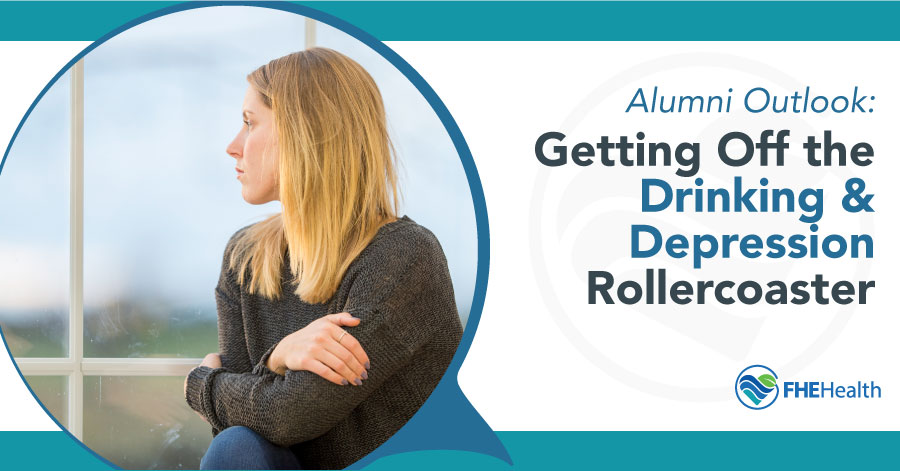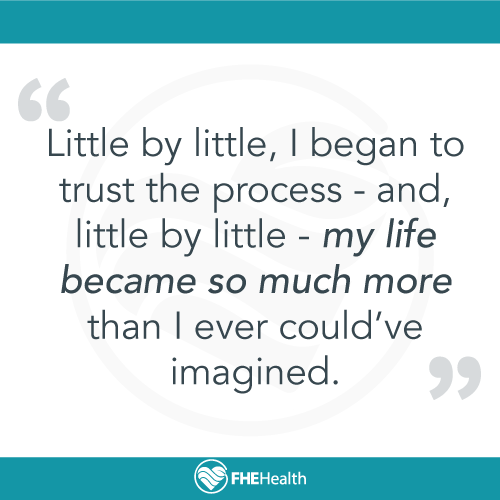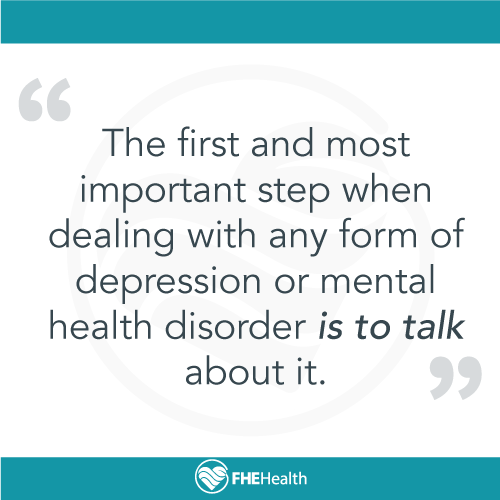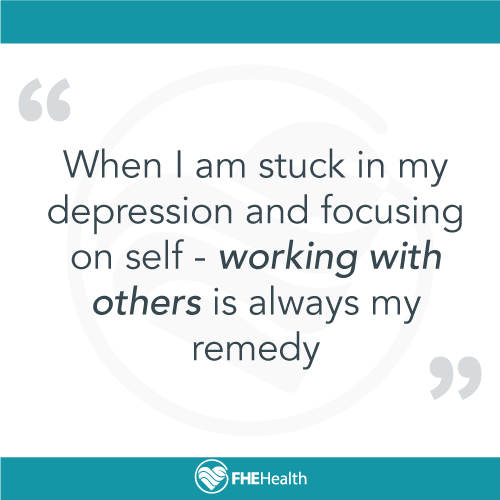
Most recovering alcoholics can relate to feeling depressed, hopeless, full of shame, and worthless. The vicious cycle of alcoholism and depression can be seemingly insurmountable and hopeless. I remember being told that once I became sober, I would feel better. In the beginning, that was the only thing that kept me from picking back up. I felt beaten into a state of utter submission. I remember feeling as if I would never achieve any sense of normalcy again. Little by little, I began to trust the process – and, little by little – my life became so much more than I ever could’ve imagined.
 During the peak – or pit – of my alcoholism, I became the woman I swore I would never be. I can vividly remember mornings where I would wake up to take a drink long before kissing my son good morning. More often than not, there was an internal war raging within me, and yet I’d take another sip. I was envious of every human being who could function without alcohol. My mind could not fathom the thought of continuing as a slave to alcohol, but I also could not fathom my life without it.
During the peak – or pit – of my alcoholism, I became the woman I swore I would never be. I can vividly remember mornings where I would wake up to take a drink long before kissing my son good morning. More often than not, there was an internal war raging within me, and yet I’d take another sip. I was envious of every human being who could function without alcohol. My mind could not fathom the thought of continuing as a slave to alcohol, but I also could not fathom my life without it.
My depression fueled my alcoholism and vice versa. The intertwined bond between the two was unhealthy and seemingly unbreakable. I think back to the dark era of my drinking, and how utterly depressed and hopeless I truly was. I can remember sitting outside of the Child Protective Services office, waiting to go in for my scheduled drug/alcohol screening. I knew for weeks, and yet I was sitting in the parking lot still drinking. I was thoroughly convinced that I was going to walk in and pass the test with ease. No matter how many times I swore that I would never drink again, no matter how miserable I was, no matter what consequences beseeched me — I could not stop drinking.
Finally, grace met me in the form of absolute desperation. I found myself detoxing on the cold jail cell floor. I had two options: either permanently lose custody of my son or check myself into treatment. It was time for me to head to South Florida for treatment.
 As I mentioned earlier, I held onto the belief that eventually, I’d “feel better.” The reality is, when we first get sober, we do not instantly feel better. Naturally, abstaining from the harmful and depressing chemicals that we poisoned our bodies with plays a physiological role in how we feel. However, there is so much more to sobriety and experiencing freedom from this disease. It can be incredibly disheartening when we find ourselves dealing with depression in recovery. After all, we are alcoholics that thrive on instant gratification. The idea that a person who has been drinking/drugging for multiple years can instantly feel better right now is utter insanity.
As I mentioned earlier, I held onto the belief that eventually, I’d “feel better.” The reality is, when we first get sober, we do not instantly feel better. Naturally, abstaining from the harmful and depressing chemicals that we poisoned our bodies with plays a physiological role in how we feel. However, there is so much more to sobriety and experiencing freedom from this disease. It can be incredibly disheartening when we find ourselves dealing with depression in recovery. After all, we are alcoholics that thrive on instant gratification. The idea that a person who has been drinking/drugging for multiple years can instantly feel better right now is utter insanity.
I have three years sober, and I have most definitely had days where I am battling my depression and anxiety. There is no specific rhyme or reason for why these mental deficiencies creep up; they just come and go in waves. The difference in my depression/anxiety then and now is that I don’t have to drink. Here are a few of the ways I deal with my depression as a sober woman today.
Talk about it
The first and most important step when dealing with any form of depression or mental health disorder is to talk about it. Almost mirroring the first step in Alcoholics Anonymous, there lies a dire necessity to admit that there is a problem, and there have been consequences (or symptoms) because of it. When I am struggling with depression, I take action by talking about my feelings. Depression thrives in isolation. Our thoughts become our most significant obstacle. Whether I reach out to my sponsor or even a friend in my sober support, I talk out aloud about the ideas that haunt me. An instant relief seems to rush over me. It is always beneficial for anyone struggling with depression to reach out and ask for help. Psychotherapy is perhaps one of the most effective forms of dealing with depression.
Change your habits
 An individual struggling with depression in early sobriety copes with the symptoms in his or her unique way. For those in recovery, many of us have previously used self-medication as a crutch and thus have landed ourselves in far worse situations than most of us would care to admit. We must begin to take on new, healthy habits to replace our insufficient methods of mitigating the symptoms of depression. Studies have proven that a holistic healing approach seems to be the most effective way of addressing these seemingly overwhelming and relentless feelings that arise from our looming depression. Here are a few different types of holistic therapeutic approaches to dealing with dual diagnosis disorders.
An individual struggling with depression in early sobriety copes with the symptoms in his or her unique way. For those in recovery, many of us have previously used self-medication as a crutch and thus have landed ourselves in far worse situations than most of us would care to admit. We must begin to take on new, healthy habits to replace our insufficient methods of mitigating the symptoms of depression. Studies have proven that a holistic healing approach seems to be the most effective way of addressing these seemingly overwhelming and relentless feelings that arise from our looming depression. Here are a few different types of holistic therapeutic approaches to dealing with dual diagnosis disorders.
Holistic Therapies:
- Meditation
- Nutrition Coaching
- Fitness
- Mindfulness
- Acupuncture
- Yoga
- Career Services
- Spiritual Counseling
- Reiki
- Art Therapy
- Massage Therapy
- Cognitive Behavioral Therapy
- Psychotherapy
- Martial Arts
- Music Therapy
- Outdoor Activities
- Journaling
- Dream Work
- Guided Imagery
- Prayer
Be of service
The Big Book of Alcoholics Anonymous makes it very clear how working with another alcoholic is vital to our sobriety. Much in the same way, acts of service are essential to our overall mental wellbeing. When we take the time to work with someone else and offer a helping hand, this behavior has been shown to benefits our mental health. When I am stuck in my depression and focusing on self – working with others is always my remedy. When I am thinking of others, my problems seem to subside – even if only temporarily. I can then take on an entirely different perspective as depression begins to slip away. Acts of service have the beautiful ability to reconnect us with other humans and destroy our natural desires to isolate.






